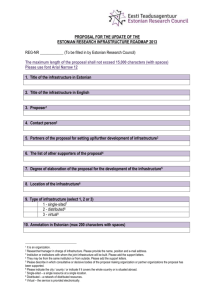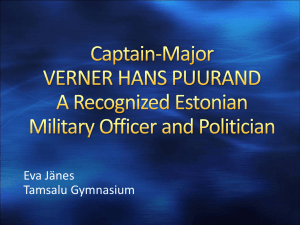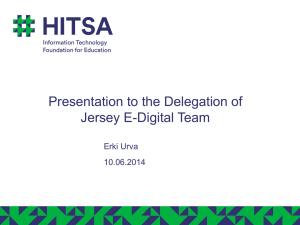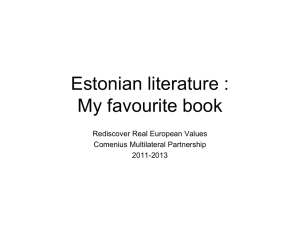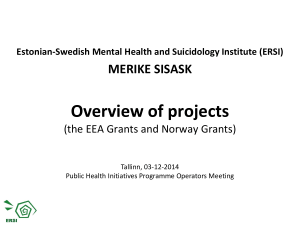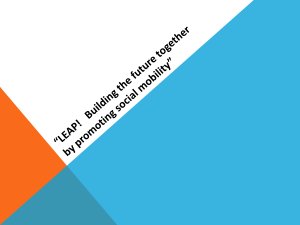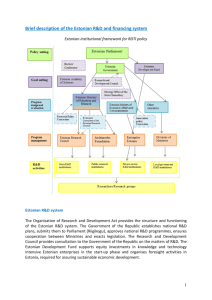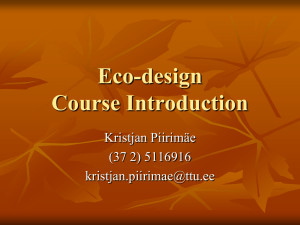Career education in Estonian schools, curriculum
advertisement
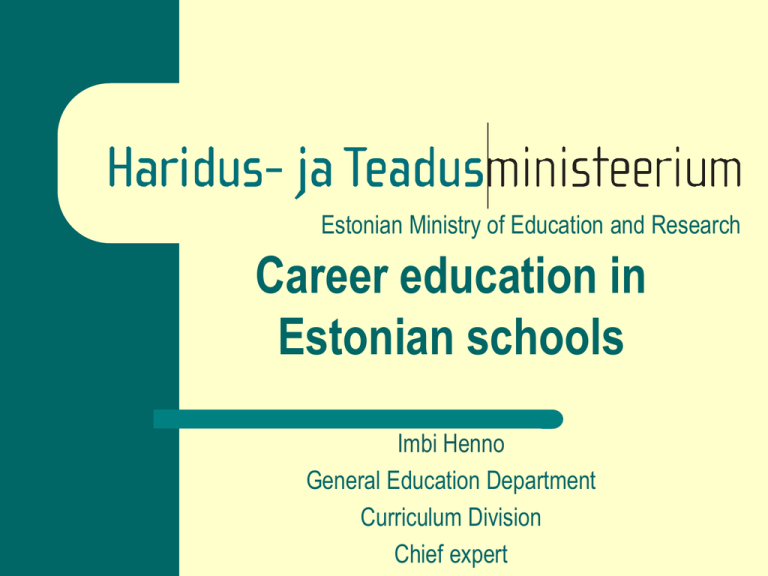
Estonian Ministry of Education and Research Career education in Estonian schools Imbi Henno General Education Department Curriculum Division Chief expert Compulsory education • Children who turn 7 years of age by 1 October of the current year attend a school. • The compulsory schooling obligation applies to children until they acquire basic education or become 17 years of age. Estonian Ministry of Education and Research Estonian Education tree Estonian Ministry of Education and Research Estonian National curriculums The first Estonian national curriculum was approved in 1996 – integrated theme: career guidance. The revised national curriculum came into effect in 2002 – integrated theme: work career and its development. Five years ago a new of school curriculum reform has been initiated. The main idea was to develop a competency-based science curriculum In January 2011, the new versions of National Curriculum for basic school and upper secondary school came into effect integrated theme: lifelong learning and career planning Estonian Ministry of Education and Research National curriculums: provide greater freedom for schools in choosing their direction of studies, make possible to consider students' interests and abilities, decrease the students' learning overload, lead students to implement knowledge in practice, emphasize the importance of integrating different subjects and emphasize the importance of creating competencies in the context of life-long learning. Estonian Ministry of Education and Research The national curriculum for basic schools and for upper secondary schools set out subject areas: 1) language and literature 2) foreign languages 3) mathematics 4) natural subjects: biology, geography, physics, chemistry and also nature studies 5) social subjects: human studies, history, social studies 6) art subjects: music, arts; 7) technology in the national curriculum for basic schools 8) physical education: physical education Estonian Ministry of Education and Research Basic Schools and Upper Secondary Schools Act § 15. The national curriculum for basic schools and the national curriculum for upper secondary schools include career studies syllabi. The syllabi of other optional subjects may be set out in the national curriculum for basic schools and in the national curriculum for upper secondary schools. § 22. Stationary and non-stationary schooling (3) Lessons also include the time of provision of various services supporting the development of students, for instance, career counselling. Estonian Ministry of Education and Research The national curriculums sets the syllabuses for optional subjects: careers education syllabus religion studies syllabus informatics syllabus Estonian Ministry of Education and Research Cross-curricular topics Cross-curricular topics are a means of integrating general and subject field competences, subjects and subject fields and are taken into account in developing the school environment. Cross-curricular topics span numerous subjects, and fields that are priorities for society, and enable creation of an idea of the development of society as a whole, supporting the pupil’s capacity to apply his or her knowledge in different situations. Estonian Ministry of Education and Research Study of cross-curricular topics is realized above all through: The structure of the learning environment Subject study – integrated themes, examples and methods shall be introduced into teaching of subjects; cross-subject, multiple-class and school projects are carried out jointly. Selection of optional subjects Creative work that stems from cross-curricular topics or which integrates subjects Organizing if possible, in cooperation with the owner of the school, regional institutions and enterprises, other institutions and associations, extracurricular learning activities and taking Estonian Ministry of Education and Research part in projects. The cross-curricular topics treated in study and educational activity are the following: 1. 2. 3. 4. 5. 6. 7. 8. lifelong learning and career planning; environment and sustainable development; civic initiative and entrepreneurship; cultural identity; information environment; technology and innovation; health and safety; values and morals. Estonian Ministry of Education and Research The cross-curricular topic – Lifelong learning and career planning Lifelong learning and career planning – the aim is for the pupil to develop into a person who is prepared to learn lifelong, perform different roles in a changing educational, living and work environments and shape his or her life through conscious decisions, including making of reasonable career choices. Estonian Ministry of Education and Research The national curriculum for basic schools and for upper secondary schools set out § 16. Notification and counselling of pupils and parents (3)The basic school shall organize notification of pupils and parents regarding opportunities for further study and shall ensure the availability of career services to pupils (career studies, information or counselling). § 24. Fundamentals and structure of preparation of school curriculum The general part of the school curriculum shall set forth the following: 9)organization of career services; Estonian Ministry of Education and Research Web-materials for teachers and students (in Estonian) Articles/collection http://www.oppekava.ee/index.php/P%C3%B5hikooli_valik aine_KARJ%C3%84%C3%84RI%C3%95PETUS http://www.ut.ee/curriculum/orb.aw/class=file/action=previe w/id=976911/LT_kogumik_II_osa_loplik.pdf Portal http://www.rajaleidja.ee/ Careers education in compulsary school: http://www.rajaleidja.ee/karjaariope-uldhariduskoolis/ Students`worksheets by subjects: http://www.rajaleidja.ee/labivteema_karjaar/ Estonian Ministry of Education and Research Thank you! Estonian Ministry of Education and Research
